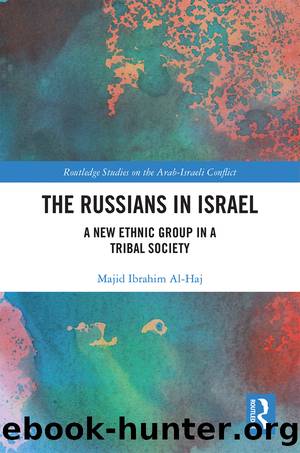The Russians in Israel: A New Ethnic Group in a Tribal Society by Majid Al-haj

Author:Majid Al-haj [Al-haj, Majid]
Language: eng
Format: epub
ISBN: 9780367662554
Google: 5r6vzQEACAAJ
Goodreads: 54813212
Publisher: Routledge
Published: 2020-09-30T00:00:00+00:00
Other identification
The retention of ethnic identity among immigrants is affected not only by immigrantsâ identification but also by how the receiving society identifies them (see Gans, 1996; Kibria, 1997; Zimmerman et al., 2007; Amit, 2012; Daha, 2013). In this sense, the receiving societyâs categorization of newcomers according to their ethnic origin plays a central role in the emergence of âreactive ethnicityâ among immigrants. Although this reactive ethnicity reinforces ethnic identity, it also leads to estrangement and alienation among immigrants and fuels prejudice against them (Phinny et al., 2001; Kosic and Phalet, 2006).
Based on the 2007 Ruppin survey data, Karin Amit highlights the significant impact of identity as perceived by veteran Israelis on self-identity among recent immigrant groups in Israel, including immigrants from the FSU (Amit, 2012: 1304). Amit indicates that âthe most significant correlation was found with perceived Israeli identity by others, indicating that the more the immigrants feel that veteran Israelis define them as Israeli, the more Israeli they feel.â In a recent nationwide study on sense of belonging and life satisfaction among post-1990 immigrants in Israel, Raijman and Geffen (2017: 12) conclude that their findings support those in the literature indicating that immigrantsâ perception of how they are defined by the receiving society affects their extent of life satisfaction and sense of belonging to the host society. In this regard, immigrants who realize they are perceived by Israeli society according to their ethnic origin (and not according to their national identity, Israeli or Jewish) report lower levels of life satisfaction and of sense of belonging to Israeli society (ibid.).
Different studies have indicated that Israel is an âethnicizingâ society in the sense that people are basically categorized by their ethnic origin (see Al-Haj, 2004a; Raijman and Geffen, 2017). This fact was evident in the attitude toward the mass immigration of Mizrahim in the 1950s, who were primarily perceived by the veteran dominant Ashkenazim as ethnically different (Eisenstadt, 1984, 1993). The same trend also applies to the mass immigration from the FSU. Shamai and Ilitov (2001) concluded that these immigrants have been labeled by veteran Israelis as Russians and their integration has been linked to their cultural assimilation within the dominant Israeli culture (ibid.). Therefore, the encounter between Russian newcomers and veteran Jewish Israelis has been characterized by continuing conflict and social alienation. Russians failed to meet the expectations of old-timers in that they were more pragmatic than Zionist and more Russian than Jewish in their lifestyles and cultural orientation (Remennick, 2012: 2).
The present study lends support for the aforementioned conclusions. The findings show that the majority of immigrants believe that veteran Israelis identify them, first and foremost, according to their ethnic origin as Russians (66.9%) and only a minority believe they are identified as Israelis (18.5%) or as Jews (9.7%). These findings are similar to those of the 1999 survey, with a slight increase in âother identificationâ as Israelis and a decrease in identification as Russians (see Figure 4.4).
Download
This site does not store any files on its server. We only index and link to content provided by other sites. Please contact the content providers to delete copyright contents if any and email us, we'll remove relevant links or contents immediately.
| Arms Control | Diplomacy |
| Security | Trades & Tariffs |
| Treaties | African |
| Asian | Australian & Oceanian |
| Canadian | Caribbean & Latin American |
| European | Middle Eastern |
| Russian & Former Soviet Union |
The Secret History by Donna Tartt(16723)
The Social Justice Warrior Handbook by Lisa De Pasquale(11506)
Thirteen Reasons Why by Jay Asher(7833)
This Is How You Lose Her by Junot Diaz(5829)
Weapons of Math Destruction by Cathy O'Neil(5080)
Zero to One by Peter Thiel(4867)
The Myth of the Strong Leader by Archie Brown(4809)
Promise Me, Dad by Joe Biden(4478)
Beartown by Fredrik Backman(4465)
How Democracies Die by Steven Levitsky & Daniel Ziblatt(4448)
Stone's Rules by Roger Stone(4438)
The Fire Next Time by James Baldwin(4373)
100 Deadly Skills by Clint Emerson(4108)
A Higher Loyalty: Truth, Lies, and Leadership by James Comey(4059)
Rise and Kill First by Ronen Bergman(4045)
The David Icke Guide to the Global Conspiracy (and how to end it) by David Icke(3913)
The Farm by Tom Rob Smith(3895)
Secrecy World by Jake Bernstein(3808)
The Doomsday Machine by Daniel Ellsberg(3758)
